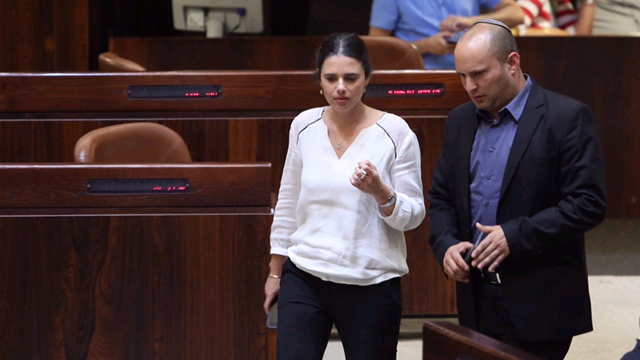Yesh Atid has proposed a new bill that depends on Bayit Yehudi to put it on the agenda; the proposed law would, inter alia, require time commitments by Cabinet members, impose meeting regularity, and appoint advisors for members.
Just a month ago, Bayit Yehudi members started a crisis surrounding the Security Cabinet. Now, with the Turkey reconciliation deal exposing again its weaknesses compared to the prime minister, a new bill is coming up to strengthen and anchor it. However, now Bayit Yehudi members will be faced with a new dilemma: to support the bill or to oppose it, together with the rest of the coalition.
MKs Ofer Shelah and Yaakov Perry (both from Yesh Atid) proposed the bill, which is to be discussed at Sunday’s meeting of the Committee of Ministers for Legislation. Minister of Justice Ayelet Shaked (Bayit Yehudi) chairs that committee, and she is likely to be under various pressures not to put it on the agenda.
Shaked and Bayit Yehudi Chairman Minister Naftali Bennett protested during the last crisis against the Cabinet’s manner of operation, and Bennett even insisted that a military secretary be appointed to every minister who is a member. The protest eventually calmed down when Netanyahu announced a thorough examination of changes in the work methods, but since then he hasn’t made any practical changes.

The new bill seeks to weaken the prime minister’s absolute power on government decisions and on setting its agenda. The law was formulated following the state comptroller’s report on Operation Protective Edge, which indicated Cabinet failings in its handling of the fighting.
Shelah said on Tuesday, “Recent events prove that nothing has improved in Cabinet work or decision-making. As Netanyahu and his ministers do not really want to change, a law is required that would force them to act correctly.”
Under the bill, a Cabinet member would be required to dedicate half a day per week for his duties as such. In addition, an advisor would be appointed for each member or each group of members. The bill also requires the Cabinet to meet monthly rather than only as needed and that summons for meetings would not be the sole prerogative of the prime minister, but available to every member of the Cabinet.
As reported by Ynetnews
